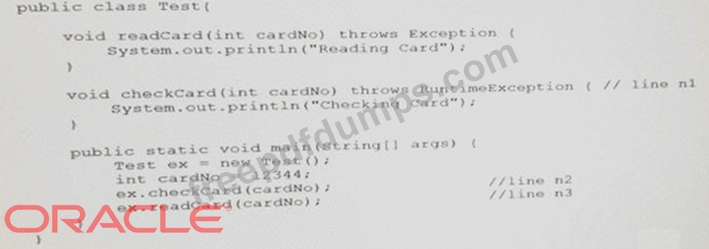1z0-809 Exam Question 31
Given:
public class Emp {
String fName;
String lName;
public Emp (String fn, String ln) {
fName = fn;
lName = ln;
}
public String getfName() { return fName; }
public String getlName() { return lName; }
}
and the code fragment:
List<Emp> emp = Arrays.asList (
new Emp ("John", "Smith"),
new Emp ("Peter", "Sam"),
new Emp ("Thomas", "Wale"));
emp.stream()
//line n1
.collect(Collectors.toList());
Which code fragment, when inserted at line n1, sorts the employees list in descending order of fName and then ascending order of lName?
public class Emp {
String fName;
String lName;
public Emp (String fn, String ln) {
fName = fn;
lName = ln;
}
public String getfName() { return fName; }
public String getlName() { return lName; }
}
and the code fragment:
List<Emp> emp = Arrays.asList (
new Emp ("John", "Smith"),
new Emp ("Peter", "Sam"),
new Emp ("Thomas", "Wale"));
emp.stream()
//line n1
.collect(Collectors.toList());
Which code fragment, when inserted at line n1, sorts the employees list in descending order of fName and then ascending order of lName?
1z0-809 Exam Question 32
Given the code fragment:
class CallerThread implements Callable<String> {
String str;
public CallerThread(String s) {this.str=s;}
public String call() throws Exception {
return str.concat("Call");
}
}
and
public static void main (String[] args) throws InterruptedException, ExecutionException
{
ExecutorService es = Executors.newFixedThreadPool(4); //line n1
Future f1 = es.submit (newCallerThread("Call"));
String str = f1.get().toString();
System.out.println(str);
}
Which statement is true?
class CallerThread implements Callable<String> {
String str;
public CallerThread(String s) {this.str=s;}
public String call() throws Exception {
return str.concat("Call");
}
}
and
public static void main (String[] args) throws InterruptedException, ExecutionException
{
ExecutorService es = Executors.newFixedThreadPool(4); //line n1
Future f1 = es.submit (newCallerThread("Call"));
String str = f1.get().toString();
System.out.println(str);
}
Which statement is true?
1z0-809 Exam Question 33
Given the code fragment:

What is the result?

What is the result?
1z0-809 Exam Question 34
Given the code fragments:
public class Book implements Comparator<Book> {
String name;
double price;
public Book () {}
public Book(String name, double price) {
this.name = name;
this.price = price;
}
public int compare(Book b1, Book b2) {
return b1.name.compareTo(b2.name);
}
public String toString() {
return name + ":" + price;
}
}
and
List<Book>books = Arrays.asList (new Book ("Beginning with Java", 2), new book ("A
Guide to Java Tour", 3));
Collections.sort(books, new Book());
System.out.print(books);
What is the result?
public class Book implements Comparator<Book> {
String name;
double price;
public Book () {}
public Book(String name, double price) {
this.name = name;
this.price = price;
}
public int compare(Book b1, Book b2) {
return b1.name.compareTo(b2.name);
}
public String toString() {
return name + ":" + price;
}
}
and
List<Book>books = Arrays.asList (new Book ("Beginning with Java", 2), new book ("A
Guide to Java Tour", 3));
Collections.sort(books, new Book());
System.out.print(books);
What is the result?
1z0-809 Exam Question 35
Given the code fragment:

What is the result?

What is the result?

